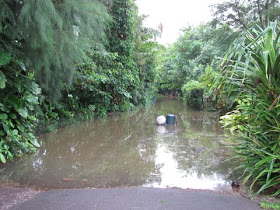Everything was white and silver and
gray, except the driftwood-littered tawny beach, when Koko, Paele and
I went walking this morning. The trades were brisk, leaning heavily
on the wind-stunted ironwoods and
whipping the sea into disorganized waves that broke every which way.
The sun itself was obscured by clouds,
but still, its light shone through through a pukalani, beaming broad
gray shafts into the place where the horizon meets the shimmery sea.
As Gov. Abercrombie meets opposition to
his attempts to wield more power and push development throughout the
state, he's begun to display an ugly arrogance, attacking the environmental and Native Hawaiian constituency that helped him get elected.
In recent days, the guv has come out
swinging against the two groups. At a Thursday meeting of the Kona-Kohala Chamber of Commerce, he derided kanaka maoli who are exercising their rights under federal
law to consult on the Big Island's Queen Kaahumanu highway project:
“It’s
being delayed by what I’m told are Native Hawaiian organizations,”
he said, adding he asked which organizations. “It’s somebody
self-designating and getting some standing. That’s something we’ve
got to move past.”
Such
“self-designating” organizations, he said, grab on to cultural
protections and environmental protections and seek standing to
prevent action in areas they decided they needed cultural activities
“discovered six minutes ago.” Those people shouldn’t get
standing and should be thrown out of court, he added.
Wow. So much for cultural sensitivity and encouraging public participation. Guess the guv wants the kanaka to sit down, shut up and join his version of state-sponsored self-determination, as outlined by the Hawaiian Roll Commission he appointed.
He
was similarly dismissive of environmentalists, denigrating those who
are opposed to SB 755 as “professional naysayers” with a
“tendency
for apocalyptic statements.”
I
think those of us committed to the concept of malama aina
have good reason to be concerned about a bill that would allow the guv to exempt state projects from any
environmental review. It would also immunize him from judicial challenges from the
public and allow DLNR and airport projects to be exempt from coastal
regulations.
Unfortunately, all of our elected
representatives — Sen. Ron Kouchi and Reps. Derek Kawakami, Dee
Morikawa and Jimmy Tokioka — voted for the bill. In other words, they're willing to throw environmental and
cultural concerns under the bus and bypass public review in order to
suck up to the guv and green-light development. Way to go, guys!
We already saw what happened when
Linda Lingle illegally assumed such power and exempted the Superferry
from environmental review. Amazingly, she's still trying to make like
what she did was right. On her Senate campaign web site, she claims:
The
Hawaii Supreme Court’s Superferry decision was a major departure
from well-established law that Governor Lingle and the Legislature
relied upon in funding and carrying out infrastructure upgrades for
the Superferry’s operation.
It's
really amazing to read her positive spin on what is undoubtably the
biggest boondoggle of her tenure, costing the state millions of
dollars and fomenting considerable public strife.
But then, politicians never really do see their actions clearly, which is why they continue to sell the wai, kai, aina and people down the river while claiming they're serving the public good. And in Abercrombie's case, getting downright nasty in the process.










